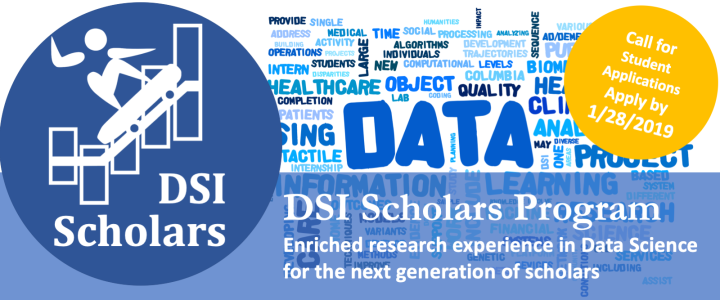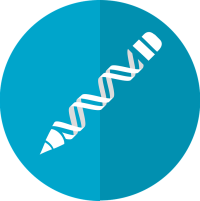Columbia University Data Science Institute is pleased to announce a new initiative under the Data Science Institute (DSI) Scholars Program: “Data for Good” undergraduate scholars who will work on projects with societal impacts. For the program’s inaugural term, Spring-Summer 2019, we are calling for applications from Columbia and Barnard undergraduate students.

Columbia University Data Science Institute is pleased to announce that the Data Science Institute (DSI) Scholars Program for Spring-Summer 2019 is open for application. The goal of the DSI Scholars Program is to engage Columbia University’s undergraduate and master’s students in data science research with Columbia faculty through a research internship. The program connects students with research projects across Columbia and provides student researchers with an additional learning experience and networking opportunities. Through unique enrichment activities, this program aims to foster a learning and collaborative community in data science at Columbia.
Taking out multiple patents on different aspects of a drug in order to cordon off competitors is standard practice in pharmaceuticals. In addition to primary patents, firms commonly attempt to acquire secondary patents on alternative forms of molecules, different formulations, dosages, and compositions, and new uses Policymakers in the U.S. and globally have raised concerns that these secondary patents can raise drug prices and restrict access to medicines. One challenge to assessing the impact of these patents is it is difficult and costly to know if a given patent is “primary” or “secondary.”

Data is central to the NYC Department of Health’s mission to protect and promote the health of all New Yorkers. The agency’s many programs often require large scale record linkages that integrate data from individuals across multiple public health data systems and disease registries. We are implementing a Master Person Index (MPI) system in order to centralize, optimize and standardize matching methodology for administrative data across the Department of Health.

We are interested in investigating how deaths and hospitalizations resulting from opioid overdoses cluster across space and time in the US. This analysis will be conducted with the aid of two comprehensive databases: 1) detailed mortality data across the US; and 2) a stratified sample of all hospitalizations in the US, which can be subset to select for opioid overdoses. Analyses will be extended to drug type (prescription drugs, fentanyl etc.) and subject demographics (age, race, etc.). We have previously conducted similar cluster analysis for other health phenomena.

Through ArXivLab we aim to develop the next generation recommender systems for the scientific literature using statistical machine learning approaches. In collaboration with ArXiv we are currently developing a new scholarly literature browser which will be able to extract knowledge implicit in the mathematical and scientific literature, offer advanced mathematical search capabilities and provide personalized recommendations.

Defective efferocytosis, the phagocytic clearance of apoptotic cells, by macrophages is the cause of many human diseases including tumor, autoimmune diseases and atherosclerosis. Enhancing efferocytosis has potential therapeutic benefits. Many key regulators of efferocytosis have been identified, but a systematic approach to map regulators of efferocytosis in an unbiased manner on a genome-wide scale is missing. This project applies innovative genome-wide CRISPR screen to discover novel regulators of macrophage efferocytosis.

